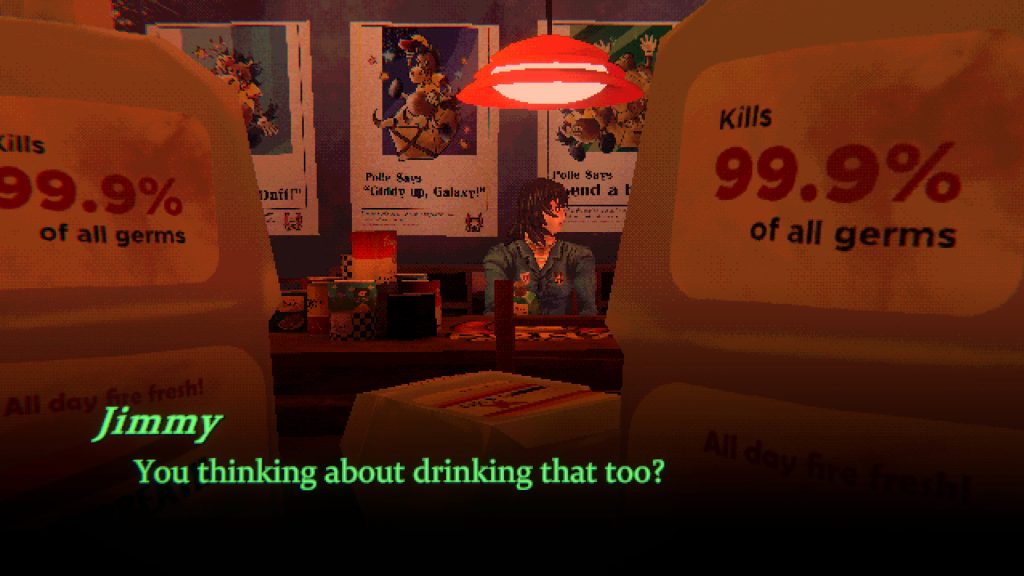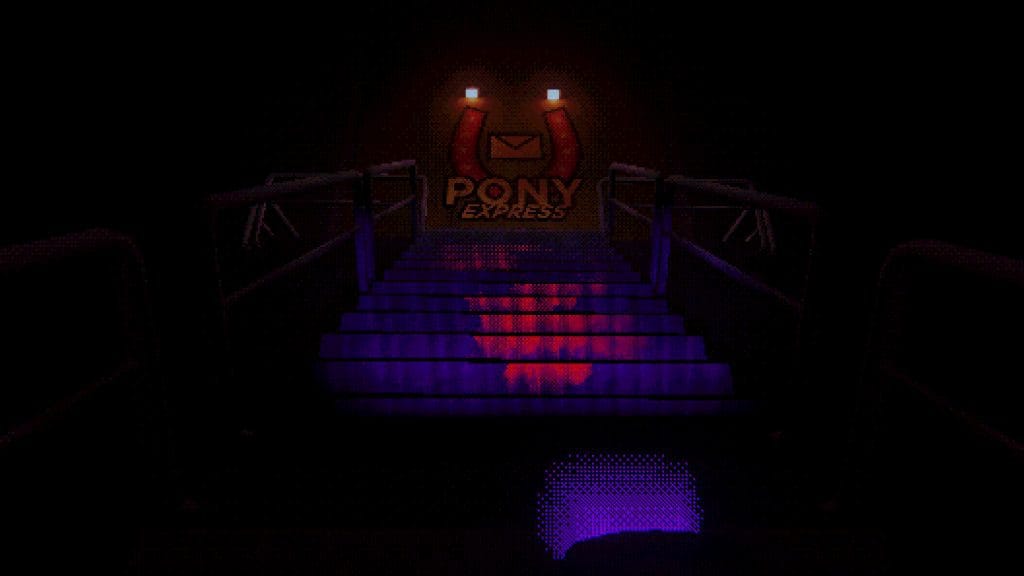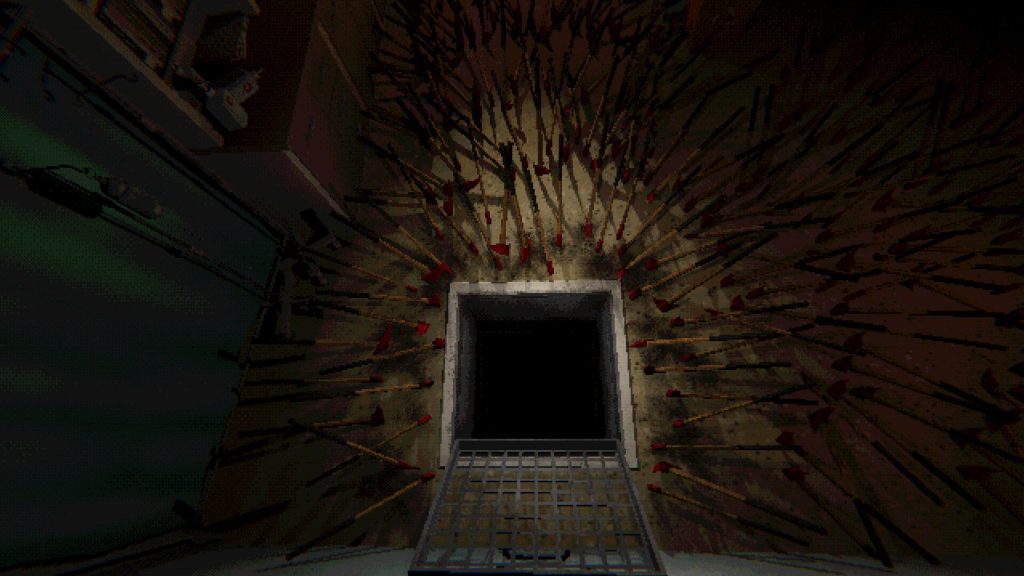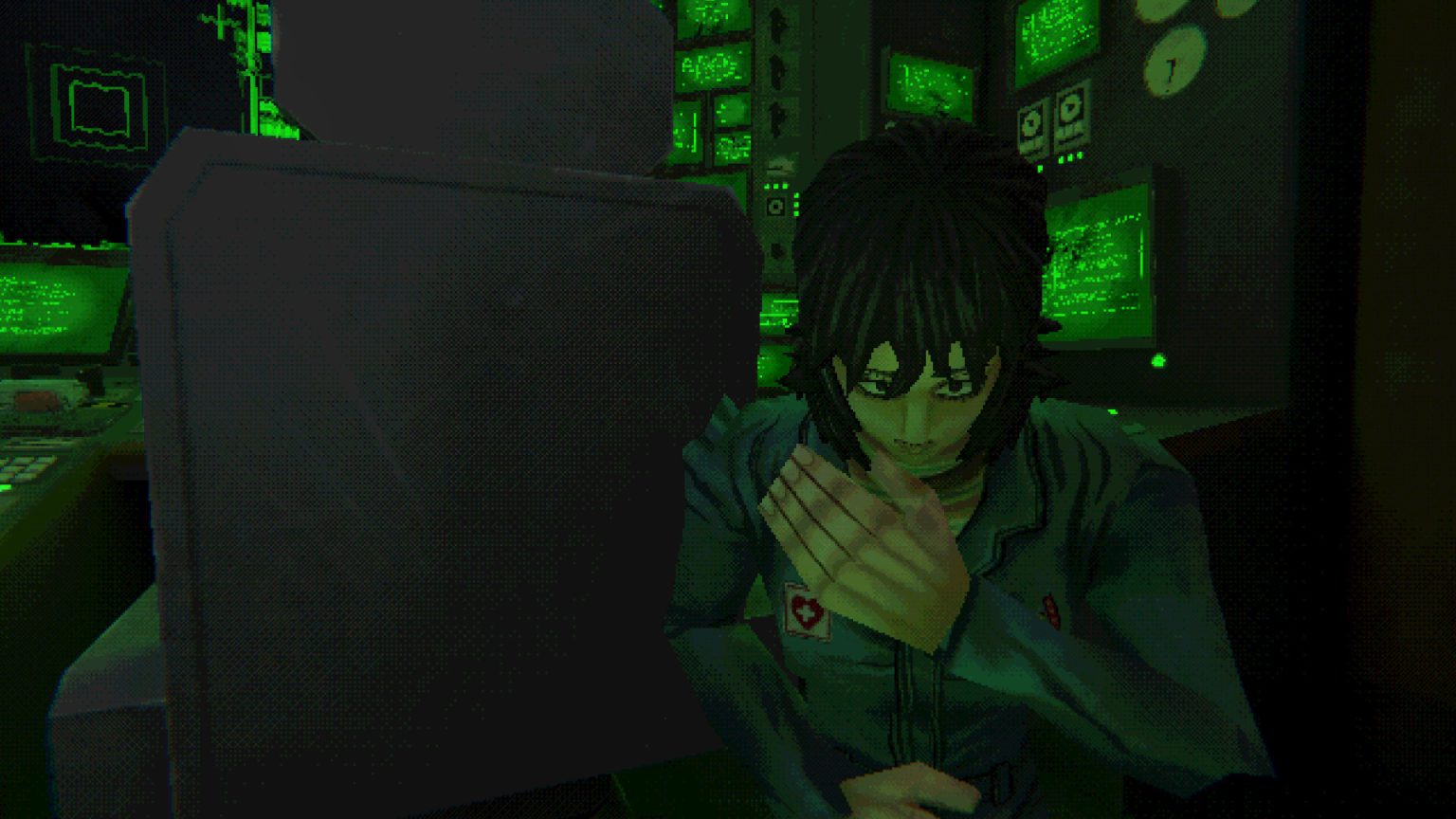I stand at my bathroom sink for my familiar evening ritual. I brush my teeth. I floss the teeth I want to keep. I pour my little cup of mouthwash.
At this late hour, I don’t think very much about where my dentist-recommended mouthwash comes from or what souls might have the duty of transporting mouthwash from coast to coast, city to city, or planet to planet. Does mouthwash even travel alongside other consumer objects?
Seemingly not in Wrong Organ’s Mouthwashing.
Mouthwashing is a brief experience. I completed its winding narrative in less than three hours. This short playtime is equal parts confounding and haunting, baffling and disturbing. The game made my skin crawl in a way that I don’t know who I can recommend it to, but I also can’t stop thinking about it.
I will try to keep spoilers to a minimum. Mouthwashing deserves your time. It is an emotional experience whose narrative would fit nicely into an interactive novel. Rather than review the game, I have chosen a more affective reflection of this unnerving experience. Mouthwashing is more than mere spectacle and greater than the sum of its discordant parts.

Fragmented in Space
Mouthwashing is non-linear. The player spends most of their time playing as the co-pilot Jimmy. The crew of Jimmy’s ship, the Tulpar, includes Captain Curly, Daisuke the intern, Anya the medic, and the mechanic Swansea. There’s also Polle, the horse mascot of the Pony Express company employing the Tulpar crew, who is sure to haunt your dreams for the next two to three weeks.
The less said about Polle, the better.
These characters’ stories, fates, and musings span many interrupted segments. Whenever Mouthwashing reveals something new, the screen mimics your machine crashing—adding a layer of stress. At times, these moments fade between perspectives; mostly, they break to a different scene depicting the cargo ship’s various forms of disarray.
Every disruption unsettles the player, just as each moment spent on the Tulpar will disturb them. There are brief glimpses of joy and celebration. One particularly memorable moment where directions must be followed to make a cake—or a beverage—creates a fragile facade of a peaceful life prior to the hellish reality. Even in these moments of respite, Mouthwashing uncomfortably mutes any hope associated with these moments.

In the Hellmouth
Mouthwashing presents a crew going through hell. It starts with the Tulpar crashing, setting the game’s narrative in motion. The fragmented narrative bounces between the time before the crash and the crew’s life afterward. The crash leaves Captain Curly bedridden, unable to speak, and badly burnt.
Jimmy and Anya give Curly pain meds in the post-crash world. The noises uttered by the captain are uncomfortable, creating the type of body horror that video games rarely explore. Not merely the horror of gore (à la dismemberment in Dead Space) or the disturbing squishiness inspired by H.R. Giger (like all of Scorn). Curly’s fate presents a certain, more vulnerable horror that considers the juxtaposition of choice and consequence, as well as the relationship between Mouthwashing’s able-bodied and disabled characters.

The game’s exploration of bodies and their imperfections creates memorable characters and further concretizes the discordance in its free-form episodic structure. Every sequence visually and audibly provokes particular bodily functions in ways that challenge the player to meditate on their own bodies. It asks that the player pull down some of their walls in ways that few games, let alone horror ones, leave room for consideration.
I am going to be a little more explicitly vulnerable than I usually am in my writing about video games: I recently quit drinking for a multitude of reasons but primarily for health. Mouthwashing is a difficult game to play during any stretch of sobriety. I cried during a particular sequence of events. I forced myself to leave the laptop and go for a little walk. There is a moment of relapse that is both extreme and difficult to watch as it unfurls across fragmented episodes. This unveiling is carefully written, unfolded across time, and not at all inevitable.
Like so many choices in life, decisions made by the cast throughout Mouthwashing weren’t written in the stars or in stones. They were avoidable, non-repeatable, and (most of the time) unlikely without intent. The game poses present (and discusses past) moments of temptation for characters to provide, withhold, and create the objects of their own demise.

Some Closing Thoughts (for What They Are Worth)
Mouthwashing is a unique, unforgettable indie horror game. From an early jump scare (that immediately made me think that Amanda wouldn’t enjoy this game at all) to the repetitive gurgling noises of the captain as Jimmy opens and closes his mouth to provide medication, the game consistently discomforts.
It is not a lighthearted walk in the space station, but Mouthwashing is unlike anything that has come out in 2024. In an amazing year for horror games, it stands in a category of its own, unlikely to have the mass appeal of the Silent Hill 2 remake or the benefit of nostalgia of Crow Country or Hollowbody. Mouthwashing’s visual aesthetic may scream ’90s 3D console game, but its story feels timely and pertinent.
I don’t know who exactly I can recommend Mouthwashing to. It feels like an obscure Cronenberg film—one that I don’t want to remain only in academic conversations, but also one that I might be embarrassed to reveal that I’ve seen, thought about, and even admired in front of certain polite company. I’m not sure that I’ll replay it anytime soon. Instead, I’ll carry it with me.
Also, I’ll never get the Mouthwashing soundtrack out of my head.
Mouthwashing, developed by Wrong Organ and published by Critical Reflex, is out now on Steam. MSRP: $12.99.
Clint is a writer and educator based out of Columbus, OH. You can often find him writing about Middle English poetry, medieval games, or video games. He just finished a PhD in English at the Ohio State University. You can find his academic and public work at clintmorrisonjr.com.








